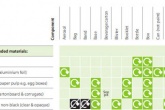OPRL launches review of labelling rules
The On-Pack Recycling Label (OPRL) scheme has announced its latest review process of its labelling rules, aiming to keep up with developments in collections services and recycling infrastructure.

The Steering Group, made up of technical experts from academia, NGOs and industry, met for the first time on 3 July, and plans to complete its work on recommending changes to the OPRL Board by October to allow for new rules to be launched before the end of the year.
The revised rules will aim to ensure that labels are reflective of the entire recycling process, taking account of sortation processes at MRFs and the likelihood of reprocessing into recyclate for use in packaging or other products.
At the 3 July meeting, the Steering Group established the group's working methods, and mapped the evidence bases and timeline for the work, in addition to discussing how to involve a broader range of stakeholders to inform and critique the work as it progresses.
Stuart Lendrum, Chair of the Review Steering Group and OPRL Director, said: “As the only evidence-based recycling label in the UK it’s essential to us that we have the right expertise and access to data on the Steering Group.
“I’m delighted and very grateful that this impressive array of industry figures has agreed to give us their support in undertaking this review. It will ensure a robust and credible process that both members and stakeholders can take assurance from.
“This review will not only ensure our labels reflect the whole recycling process for the first time, going beyond collections to sortation and reprocessing, it will also take us towards a binary labelling system, as envisaged in the recent UK Governments’ joint consultation. Since we’re undertaking this ahead of consistent collections or additional infrastructure investment occurs, there may be areas where the Steering Group feel it is too early yet to make that decision, but that’s our aspiration. And to support that move, OPRL has commissioned consumer insight research on the most effective calls to action for our labels in future.”
Jane Bevis, OPRL Chair, added: “The public is demanding more information on recyclability and wants to be assured of its accuracy – 84 per cent check packaging for recycling advice. As the UK’s most trusted and widely recognised recycling label we’re determined to get this right, so we’re investing in research, getting the right people round the table and have engaged Richard Parker as our Programmes Manager to ensure we run a robust process.”
The OPRL review will be further informed by work undertaken by members of the UK Plastics Pact, launched in April 2018 by the Waste and Resources Action Programme (WRAP) and the Ellen MacArthur Foundation to commit businesses across the supply chain to tackling plastic packaging pollution, and the Confederation of Paper industries/WRAP group on paper and board recyclability, providing a “substantial body of work and wide cross-sector consensus” for the Steering Group to draw on, according to Bevis.
Improved labelling key to higher recycling
Public confusion over what can be recycled has placed limitations on UK recycling rates, which remain at around 45 per cent. The recent Resources and Waste Strategy, published by the Department for Environment, Food and Rural Affairs (Defra) in December, conveyed the government’s commitment to removing the confusion around recycling. The strategy outlined plans to do so by improving the clarity of labelling, as well as by ensuring greater consistency of recycling collections across England.
OPRL has made significant breakthroughs in reducing confusion through its clear and consistent recycling labels, according to a study by plastics recycling charity RECOUP, who revealed that confusion over what to do with packaging was markedly reduced when the packaging bore OPRL labels.
Improved labelling and increased investment in communications around recycling have also been identified as key to reaching the Plastic Pact’s target to make 70 per cent of packaging recycled or composted by 2025, as well as designing plastic packaging to be easily recycled at their end of life, which OPRL will be supporting through the update of its recyclability evaluation tool update, PREP.
The tool allows packaging technologists to accurately depict the recyclability of an item of packaging and is compliant with the ISO 14021 standard, an international standard for environmental labelling, which seeks to ensure that labels are accurate and verifiable.
OPRL Review Steering Group membership
- Stuart Lendrum, OPRL Board and Chair of the Steering Group
- Helen Bird and Adam Herriott, WRAP
- Alison Bramfitt, Nestlé
- Paul East, RECOUP
- Iain Ferguson, Co-op
- Keith Freegard, OPRL Board and BPF
- Mandy Kelly, ACE UK
- Adam Read, Suez and CIWM
- Robbie Staniforth, Ecosurety
- Carole Taylor, LARAC
- Simon Weston, CPI
- Jane Bevis, OPRL Chair
- Richard Parker, OPRL Programmes Manager
- Alice Harlock, OPRL Membership and Marketing Manager
You can find out more information on the OPRL website. 







